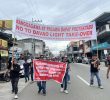DAVAO CITY – Thousands of rubber tappers and small farmers demonstrated in the streets of a town near the provincial capital of North Cotabato on Monday to call on government to intervene in the fall of rubber prices since 2012.
Shouting their demands that the price of raw rubber in the province be increased, members of the Free Tappers Federation–North Cotabato (FTF-NC) briefly barricaded the highway of Makilala, North Cotabato.
The more than 2,000 rubber tappers and small planters called on government to put measures to regulate rubber price.
Joselito Roxas, chairperson of the FTF-NC said that the current price of rubber “complum” (latex) is only P23 per kilo for the 15-day harvest rate and only P18 per kilo for the 10-day harvest rate.
“The price has fallen from P38 since 2012. We cannot live anymore with such prices and the compradors only say the prices are according to the world market,” said Roxas in a telephone interview with Davao Today.
Roxas said that according to their research, the world market price for the Dry Recovery Content (DRC) of rubber is P115 per kilo.
“For us the price should be raised to at least P50 per kilo for the latex and maybe P98 for the DRC,” said Roxas.
Roxas said that unlike other crops, tappers and small planters – those tilling one to two hectares of land – of rubber “cannot intercrop” and have no other means of growing food crops.
“Nothing survives even coconut as the roots of the rubber will kill the intercropped plants. We can only grow vegetables outside the plantation area,” said Roxas.
Roxas said that among those who participated in the protest were tappers and farmers from the North Cotabato municipalities of Arakan, Matalam, Antipas, Roxas, Kidapawan, Magpet, Makilala, Tulunan and M’lang.
He said that only a few buy latex from the said municipalities and only one exports it.
Pedro Arnado, spokesperson of the Kilusang Magbubukid ng Pilipinas (KMP) Southern Mindanao, an alliance of peasant organizations, said that “the monopoly and lack of political will of the government failed to control the price of rubber.”
“In August 2014, we asked the Department of Agriculture national office to do something to regulate the price but their action on the matter remains to be seen,” said Arnado. (John Rizle L. Saligumba/davaotoday.com)








